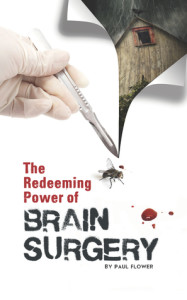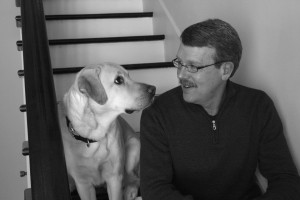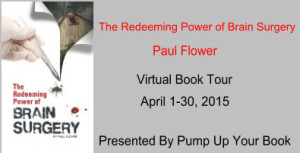Looking back, I realize my mother instilled in my brothers and I a love of reading and books. Oh, and here’s a kind of creepy fact: I used to watch the television show “The Waltons” (it’s a 70s thing) and imagine being John Boy, the narrator/oldest son/author. Sounds very quaint and a little dumb now, but that character made storytelling real to me. Then when I read The Grapes of Wrath in high school, I was awed not just by the story, but also by the way it was written. Steinbeck’s use of language and descriptive powers inspired me and they still do. He and others showed me the art of saying something, of describing something, in a way that was new, fresh and revealing. He moved me. I wanted to do that; I still want to do that. It was the words and how he arranged them. It’s always been about that for me.
Tell us (we won’t tell promise!) is it all it’s cracked up to be? I mean what are the perks and what are the demands?
After more than three decades of writing professionally (primarily in advertising), it is still very demanding work; emphasis on the word “work.” Writing long form fiction can be incredibly taxing. A reader turns the page and sees what’s next. An author turns the page and sees a blank page. Book-length fiction requires patience, stamina and an ego big enough to think you can create something people will buy. One of the perks is that I get to breathe life into people and their stories; it’s a God-like thing. The downside is that patience. You have to toil at it, constantly revising and polishing, many times with no certainty that the story’s threads are all going to weave together. Then there’s the leap of faith you are taking that someone else will ever read it. Ultimately, the real satisfaction––the ultimate perk––is stepping back and reading it and being moved by your own work. My reaction typically is, “where did that come from?”
Which route did you take – traditional or self-published – and can you give us the nitty gritty low down on what’s that like?
I wrote the first draft of The Redeeming Power of Brain Surgery nearly 30 years before it was published by Scribe Publishing of Royal Oak, MI. That first draft came in the age of the big publishing houses––they controlled the industry. Over the years, I accumulated a huge file of rejections. I kept revising the manuscript, and while I got some positive feedback about the story, no one would take it on. Even as self-publishing became a viable option, I always felt the book (and I) needed the affirmation and support that came from having a publisher. The turning point came in 2009. I had lost my full-time job in advertising. One day, I was searching for freelance writing gigs on craigslist, and found a post from Scribe, a publishing startup begun by Jennifer Baum at Scribe. I pitched the book. She bought it. The irony is, companies like Scribe are products of the digital age––you no longer need a huge staff and printing operations to publish books––and I lost my job in the ad world in part because of changes brought on by the digital age. Go figure.
What’s the snarkiest thing you can say about the publishing industry (e.g. rejections, the long wait, etc.)
Back when I finished that first draft, the big publishing houses wouldn’t publish manuscripts that weren’t represented by agents and agents wouldn’t represent authors who’d never been published. While I recognize there is a lot of mediocre material out there, and there needs to be a way to weed it out, I can’t help but think there are also good authors who simply gave up because of that system. As media evolve and the idea of “book” evolves with it, I hope there’s room for good, fresh voices.
Tell us for real what your family feels about you spending so much time getting your book written, polished, edited, formatted, published, what have you?
My wife and kids (we have four, now all grown) were always supportive, mostly because I have been an advertising copywriter for 33 years. Writing was always my thing. As far as how they felt about the fiction writing and my near-endless quest to be published, well there was a lot of good-natured kidding about “dad writes books, too bad nobody has seen them.” (This is what I get for raising smart alecks.) I do have to add that my wife always has encouraged me––literally couldn’t have gotten to this point without her––and my family was as thrilled as I was when this book was published.
What was the craziest or insane thing that happened to you in the book publishing process?
Oh that’s easy. I spent 30 years toiling in advertising and writing fiction on the side, hoping to become an author. Then I lost my advertising job, in part because of the digital boom. I became published, in part because of the digital boom. It’s the stuff of fiction.
How about the social networks? Which ones do you believe help and which ones do you wish you could avoid?
I stick to Facebook, Twitter, Goodreads and LinkedIn. They make it easy to tell readers and potential readers what I’m up to, and also are good ways to get feedback. I have to admit, I’m barely scratching the surface on how to use them effectively.
Book sales. Don’t you just love them (or lack of?)? How are you making the sales happen for you?
I have spent a lot of time emailing book stores, book festivals, newspapers, radio stations––anyone who might let me do a book signing or who might want to interview me. I am constantly networking via social media, too. I have a press release about the book. Through all of that, I’ve been invited to several signings and interviews. You name it, I’ve been doing it. Promoting your book is almost as challenging as getting published. You can’t give up.
What is one thing you’d like to jump on the rooftop and scream about?
I think there are many many goodhearted people out there who have dreams of publishing a novel. Quite often, many people trivialize the process and make it sound easy. It’s not for anybody. It’s heavy lifting. You sweat and bleed over it. It is art. I think self-publishing is a great thing. It’s opened the door to many talented people and their books. But I also am frustrated that it’s made “getting published” a little less special.
Can you tell us what you love about being a published author and how all those things above doesn’t matter because it’s all part of the whole scheme of things and you wouldn’t have it any other way?
Bam. That’s it. You said it. The thing I love the most is when I can talk not about being published, but about what I published. I love to read a passage, to hear the cadence and feel what I’m hoping every reader will feel. I love the idea that someone might close her or his eyes and see the scene I have in my head and feel the pain that character felt at that moment. In the end, it’s not about being an author. It’s about the words. It’s about knowing that all the rejection and revisions and polishing and selling ends with someone, somewhere reading a sentence I wrote and being moved by it.
About The Book
Title: The Redeeming Power of Brain Surgery: A Suspense Novel
Author: Paul Flower
Publisher: Scribe Publishing Company
Publication Date: June 1, 2013
Pages: 250
ISBN: 978-0985956271
Genre: Susepense
Format: Paperback, eBook (.mobi / Kindle), PDF
Book Description:
Jesse Tieter, M.D. has carefully constructed the ideal life. But lately, neither his Chicago-based neurology practice nor his wife and son are enough to suppress the memories that have haunted him since he was a little boy. He can't stop thinking about that summer day in 1967 when his father died.
So Jesse is heading back. Back to the town and the place where a long-repressed horror occurred. Back to make sure his twin keeps the family's secret buried.
But what will he uncover along the way?
Book Excerpt:
His son’s hand felt like a lie. Lately, to him,
everything felt this way. The look of sadness on his wife’s face, the burn of a
drink in his throat, the whine of a saw in the O.R.; nothing seemed true. Nothing
was real anymore. He felt out of balance, too. Even now, the school building,
the flag slapping against the heavy fall sky¬¬—everything was tipping away from
him. It was as though he’d gotten up that morning and screwed on his head
carelessly, as though he hadn’t threaded it good and tight. While shaving, he’d
cut himself, a discrete, semi-intentional knick just under the curve of his
chin. He’d stood there like an idiot, eyes feeding the message “blood” to his
brain, nerve endings responding with “pain” and the logic center unable to
formulate a response.
“Dad? Daddy?”
“Uh? Wha’?”
“Pick up the pace. Chop chop. Move out.”
Now, as he snaked through the crush of other
parents and children, he had to look down to convince himself the boy was
there, attached to the hand, flesh and bone. The red hair, “his mother’s hair”
everyone called it, was sliced by a crisp white part; his head bounced in beat
with his sneakered feet. The child was so painfully real he couldn’t be a lie.
It amazed him that his son looked so much like his
wife, especially the tiny mouth, the way it was set in a crooked, determined
line. He was a kid who liked to have fun, but he could be fierce. Today, the
challenge of a new school year, of third grade, had brought out the determined
streak. This was good. They would need that streak, he and his mother would.
“Whoa.” The
tiny hand now was a road sign, white-pink flesh facing him, commanding him. Far
enough. He obeyed. Squatting, arms out for the anticipated embrace, he suddenly
wanted to tell everything. Tears swam. His throat thickened. The earth tilted
and threatened to send him skittering over its edge. There was the slightest of
hugs, the brush of lips on his cheek then the boy was off, skipping toward the
steps as though third grade challenged nothing, caused no fear, as though the
world was in perfect balance.
He walked back to his Lincoln Navigator with the
exaggerated care of a drunk who didn’t want anyone to know his condition. He
got behind the wheel and suddenly was no longer in his 50s; he felt 16 and too
small, too skinny and insignificant to handle the giant SUV.
He nosed the vehicle toward home, alternately
trembling and gripping the wheel as he merged with the morning traffic. The
plan struck him now as odd and silly, the challenges too great. His hands,
already red and scaly, itched fiercely. Get a grip, he told himself. Get a
grip.
His tired mind—when was the last time he’d really
slept well?—jumped from one stone of thought to another. Was everything covered
at work? The bills—had he paid them all? Did his wife suspect anything? Yes.
No. Absolutely. Of course not. Relax. Relax. He left the expressway at the exit
that took him past their church and wondered if the church, too, was a lie.
What of the wedding there so many years ago?
Through a stoplight and past a Dunkin’ Donuts, his
gaze floated around a corner. A flash of inspiration—hit the gas. Let the tires
slide and the back-end arc around. Let physics have its way until the big
vehicle broke free from the grip of gravity and danced head over end, coming to
a stop with him bleeding and mercifully, gratefully dead inside.
No. He had something to do. Had he figured the
angles right? Gotten the plan tight enough?
A horn jabbed through his reverie. He had drifted
into the turn lane of the five-lane street. He jerked the wheel and cut across
traffic into the right lane. Tires screeched, horns screamed. A black Toyota
streaked past on his left, the driver’s fist, middle finger erect, thrust out
the window.
Rage, sharp and bitter, bubbled in his throat. He
hesitated, then jammed his foot on the accelerator, cut the wheel hard, and
sent the Navigator careening into the left lane.
A staccato barrage of profanity pounded the inside
of his skull. He bit his tongue to keep the words in. His heart hammered and a
familiar, dizzying pressure filled his ears. The SUV roared ahead, past one
car, past a semi then another car, quickly closing the gap on the speeding
Toyota. He couldn’t see the car’s driver but he could imagine him, some stupid,
simple-minded schmuck, eyes locked on the rear-view mirror as the lumbering
Lincoln grew larger, larger, larger. The instant before he would slam into the
smaller vehicle, he jabbed his brake and turned again to the left. There was a squeal
of tires and more horns bleating behind him; the semi rig’s air horn bellowed
angrily past. Ramrod straight, eyes fixed ahead on the now-slow-moving car
disappearing tentatively around a curve, he brought the Navigator to a
shuddering stop in the center lane. He tensed and waited for the resounding
WHUMP of a crash from behind. None came. Face flushed and eyes gleaming,
suddenly rejuvenated, he accelerated quickly then eased the Navigator back into
the flow of traffic—no looking back.
Buy The Book:
Barnes & Noble: http://www.barnesandnoble.com/w/the-redeeming-power-of-brain-surgery-paul-flower/1115659168?ean=9780985956271
Discuss this book in our PUYB Virtual Book Club at Goodreads by clicking HERE
About The Author
Paul Flower is an author, advertising copywriter/creative director and a journalist.
He has written and produced award-winning advertising for print, radio, television, outdoor, the Web––really, just about every medium––for business-to-consumer and business-to-business accounts.
His news features have appeared in regional and national magazines. His first novel, “The Redeeming Power of Brain Surgery,” was published in June 2013 by Scribe Publishing. Visit Paul’s website at paulflower.net.
Author Website: paulflower.net
Author Page / Publisher Website: http://scribe-publishing.com/brain/ Facebook: https://www.facebook.com/paulflower.writer
Twitter: https://twitter.com/flowerpaul Goodreads: https://www.goodreads.com/author/show/7137509.Paul_Flower





1 comment:
Kathleen
Great questions! Appreciate your asking questions others have not. You were able to gain some good insights. Nice.
Post a Comment